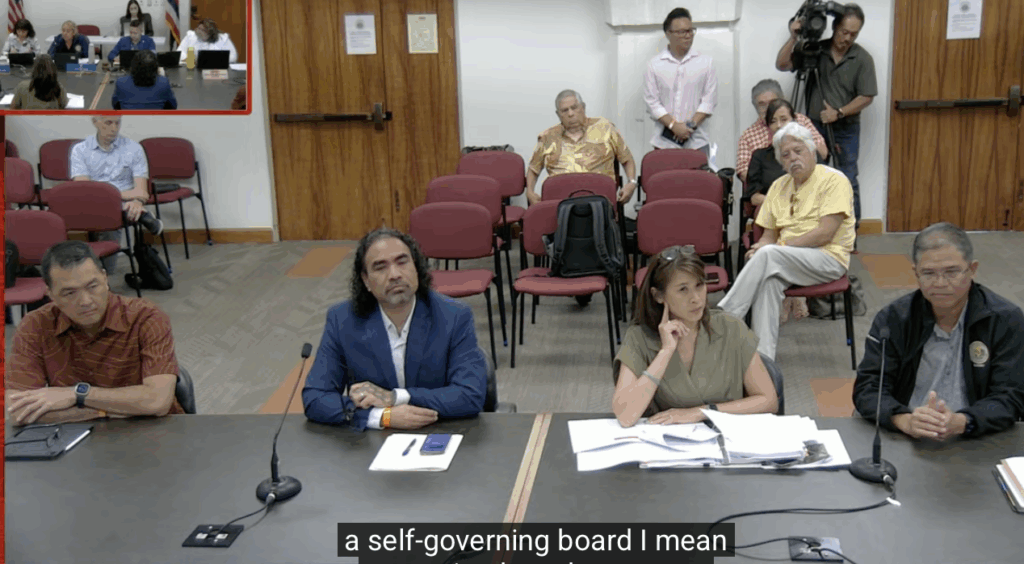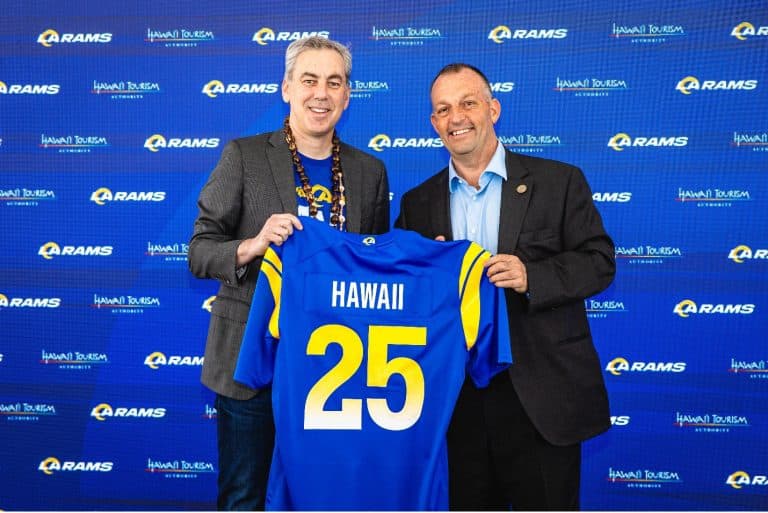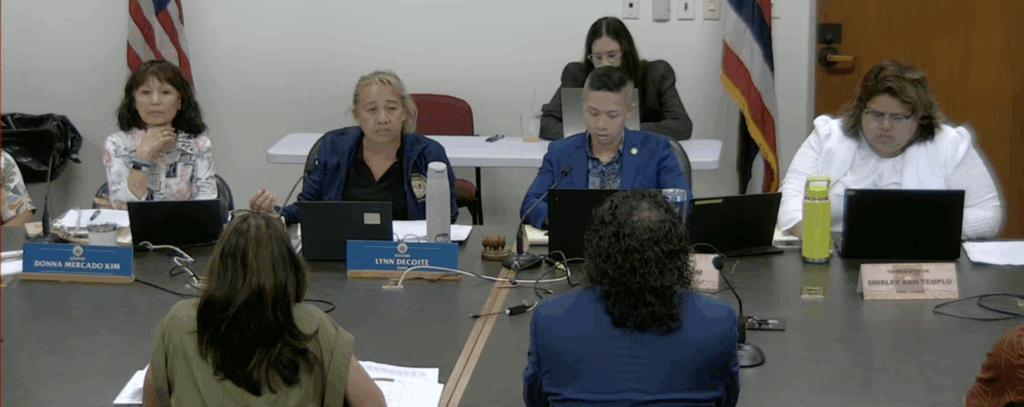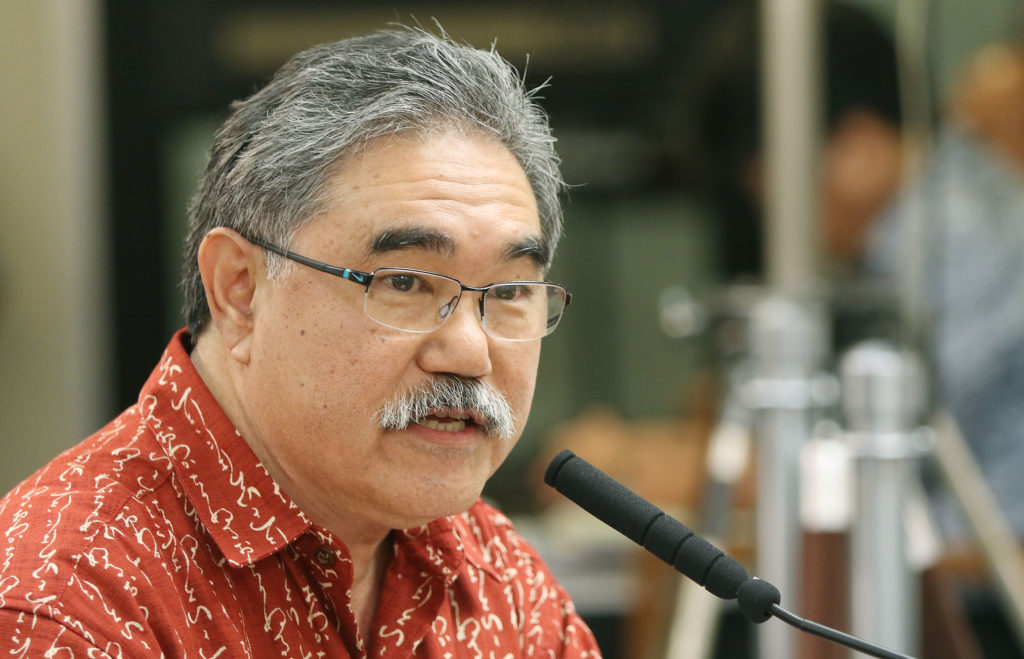Hawaiʻi lawmakers grilled leaders of the Hawaiʻi Tourism Authority all day on Monday, drilling down on questions about financial management and the overall effectiveness of an organization on the verge of chaos.
Lawmakers covered everything from a marketing contract with the Los Angeles Rams to controversies involving a senior financial officer now on unpaid leave to a practice of asking board members to remove agenda items to avoid critical press coverage.
 Hawaiʻi Tourism Authority board Chairman Todd Apo, left, Hawaiʻi Visitors and Convention Bureau Chief Executive Aaron Salā, acting HTA Chief Executive Caroline Anderson and Department of Business, Economic Development and Tourism Director Jimmy Tokioka answered questions from lawmakers on Monday. (Hawaii Legislature/Screenshot/2025)
Hawaiʻi Tourism Authority board Chairman Todd Apo, left, Hawaiʻi Visitors and Convention Bureau Chief Executive Aaron Salā, acting HTA Chief Executive Caroline Anderson and Department of Business, Economic Development and Tourism Director Jimmy Tokioka answered questions from lawmakers on Monday. (Hawaii Legislature/Screenshot/2025)At one point during the marathon hearing, Sen. Lynne DeCoite, who chairs the Senate Committee on Economic Development and Tourism, summed up the theme of the informational briefing.
“Houston, we have a problem,” she said. “And we have to fix it.”
Gov. Josh Green plans to ask for the resignations of every member of the authority’s board, according to a statement provided by his office to Hawaii News Now.
“Because the responsibilities of the board have changed to an advisory role, he feels it best to start with a clean slate,” the statement said. “The HTA board as it was previously established no longer exists, so it makes sense to look at the composition of the new board.”
“Sometimes you’ve got to take just a whole different direction.”
The tourism authority’s acting chief executive, Caroline Anderson, spent much of Monday on the hot seat, facing questions from members of DeCoite’s Senate committee and the House Committee on Tourism. While Anderson has implemented a 90-day plan to get HTA back on track, the informational briefing reinforced the image of an agency embroiled in strife.
HTA has lacked a permanent chief executive for nearly two years, and the agency has been shaken by defections of key staff. Its interim president and chief executive, Daniel Nāhoʻopiʻi, Chief Stewardship Officer Kalana Ka‘anā‘anā and spokesman T. Ilihia Gionson have all left in the past year.
On top of that, the organization’s head of finance and acting chief administrative officer, Isaac Choy, was recently placed on unpaid leave for allegedly creating a hostile work environment for Native Hawaiian employees. He’s fired back with a lawsuit saying he was removed for reporting procurement violations and widespread financial waste within the tourism agency.
Meanwhile, the whole organization faces major structural changes thanks to a new law signed by Green in May.
For lawmakers, the bottom line was about spending taxpayer money — HTA gets about $63 million a year to market Hawaiʻi and mitigate overtourism — on a flawed agency.
DeCoite said the agency is asking the state for more money to run a program that is “literally flawed,” adding that “sometimes you’ve got to take just a whole different direction.”
L.A. Rams Lūʻau Cost Taxpayers $80,000
Lawmakers spent significant time asking about procurement policies. A case in point involved a marketing contract with the Los Angeles Rams. The $1.8 million contract calls for the Rams to promote Hawaiʻi in the state’s largest market for visitors and to put on a mini-camp on Maui, including flag football for girls, which was held June 18.
DeCoite praised the event and the goodwill it brought the community. So did Sen. Donna Mercado Kim and Jimmy Tokioka, director of the Department of Business, Economic Development and Tourism, which oversees HTA.
 Gov. Josh Green and Los Angeles Rams president Keven Demoff announced a tourism marketing contract between the state and team in June. An ambiguity in the Hawaiʻi Tourism Authority’s contract with the Rams means the state will have to pay an estimated $80,000 for an event on top of the $1.8 million contract. (Courtesy of LA Rams)
Gov. Josh Green and Los Angeles Rams president Keven Demoff announced a tourism marketing contract between the state and team in June. An ambiguity in the Hawaiʻi Tourism Authority’s contract with the Rams means the state will have to pay an estimated $80,000 for an event on top of the $1.8 million contract. (Courtesy of LA Rams)The issue was an apparent hole in the Rams’ contract. Not clear from the document was how much the state would be on the hook for a 400-person lūʻau with an open bar that was part of the Rams’ visit to Hawaiʻi. That event tacked on at least $80,000 to the costs to the state, Tokioka said.
The sole-source contract called for the Rams to pay a maximum of $5,000 for the event, leaving the state to pay the rest. HTA officials couldn’t explain exactly how the provision became part of the contract, which they said was negotiated by Kaʻanāʻanā, who’s no longer on staff.
Mercado Kim criticized the tourism agency for overlooking such hidden costs.
“This is not just one contract,” she said. “This is inherent in your whole system.”
 Sens. Donna Mercado Kim, left, and Lynn DeCoite and Rep. Adrian Tam spent Monday questioning state tourism officials about the Hawaiʻi Tourism Authority (Hawaiʻi Legislature/Screenshot/2025)
Sens. Donna Mercado Kim, left, and Lynn DeCoite and Rep. Adrian Tam spent Monday questioning state tourism officials about the Hawaiʻi Tourism Authority (Hawaiʻi Legislature/Screenshot/2025)Another issue involved a $780,000 interest charge on late payments to the organization’s main marketing contractors, the Hawaiʻi Visitors and Convention Bureau, which has a $38.6 million two-year contract for marketing, and the Council for Native Hawaiian Advancement, which does destination management under an $18.7 million contract.
Anderson, the authority’s acting chief executive, said the state will not be on the hook for the $780,000, which she said will come from the visitors bureau’s existing contract. Not satisfied, Kim asked how the money spent to cover interest was furthering the goal of marketing Hawaiʻi as a tourist destination. That would leave a $780,000 hole somewhere else.
Kim also called out Anderson for placing Choy on leave in May when Choy was the one who raised questions about the cost. In May, Anderson placed Choy on unpaid leave for making derogatory remarks about Native Hawaiians. Tokioka has said he heard one such comment, reprimanded Choy and demanded an apology.
Choy, a former longtime lawmaker, has shot back with a whistleblower lawsuit saying he’s being retaliated against after reporting procurement violations and other problems at HTA that are wasting millions of dollars.
Kim raised questions about the dispute.
“We have a qualified person who has a target on his back because he flushed out the deficiencies,” Kim said. “How is that fair?”
Sen. Kurt Fevella, who has criticized Choy for using the term “dumb Hawaiian” during contract negotiations with the Council for Native Hawaiian Advancement, said, “Nobody has put a target on anyone’s back.”
The issue, he said, was a racial slur “about our people being ‘dumb Hawaiians.’”
 David Arakawa, chair of the Hawaiʻi Tourism Authority’s Budget, Finance and Convention Center Committee, said he was asked to take items off a meeting agenda to avoid bad press for the agency. (Cory Lum/Civil Beat/2018)
David Arakawa, chair of the Hawaiʻi Tourism Authority’s Budget, Finance and Convention Center Committee, said he was asked to take items off a meeting agenda to avoid bad press for the agency. (Cory Lum/Civil Beat/2018)Anderson’s time on the hot seat got even more tense at one point when HTA board member David Arakawa joined Anderson at the table. According to Arakawa, who chairs the tourism agency’s Budget, Finance and Convention Center Committee, Anderson asked him to remove items from a committee agenda for a May meeting because they might result in bad press.
Anderson explained to lawmakers that staff didn’t have the information to answer the questions and that she was trying to create a spirit of collaboration in the organization.
“You’re not collaborating,” DeCoite said. “You’re dictating.”
When Anderson denied Kim’s allegation that Anderson was acting like a “gestapo,” Kim shot back, “If you can say, ‘Take something off the agenda,’ then you are one: I’m sorry.”
Rep. Adrian Tam, who chairs the House Tourism Committee, offered another suggestion for avoiding critical media attention.
“If you want to avoid bad headlines,” Tam said, “I think the better approach would actually be to address the problems head-on instead of putting it under the rug.”
